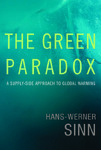Please use this identifier to cite or link to this item:
http://lib.hpu.edu.vn/handle/123456789/33399Full metadata record
| DC Field | Value | Language |
|---|---|---|
| dc.contributor.author | Sinn, Hans-Werner | en_US |
| dc.date.accessioned | 2020-08-03T08:48:28Z | - |
| dc.date.available | 2020-08-03T08:48:28Z | - |
| dc.date.issued | 2012 | en_US |
| dc.identifier.isbn | 9780262016681 | en_US |
| dc.identifier.other | HPU2164263 | en_US |
| dc.identifier.uri | https://lib.hpu.edu.vn/handle/123456789/33399 | - |
| dc.description.abstract | The Earth is getting warmer. Yet, as Hans-Werner Sinn points out in this provocative book, the dominant policy approach--which aims to curb consumption of fossil energy--has been ineffective. Despite policy makers' efforts to promote alternative energy, impose emission controls on cars, and enforce tough energy-efficiency standards for buildings, the relentlessly rising curve of CO2 output does not show the slightest downward turn. Some proposed solutions are downright harmful: cultivating crops to make biofuels not only contributes to global warming but also uses resources that should be devoted to feeding the world's hungry. In The Green Paradox, Sinn proposes a new, more pragmatic approach based not on regulating the demand for fossil fuels but on controlling the supply. The owners of carbon resources, Sinn explains, are pre-empting future regulation by accelerating the production of fossil energy while they can. This is the "Green Paradox": expected future reduction in carbon consumption has the effect of accelerating climate change. Sinn suggests a supply-side solution: inducing the owners of carbon resources to leave more of their wealth underground. He proposes the swift introduction of a "Super-Kyoto" system--gathering all consumer countries into a cartel by means of a worldwide, coordinated cap-and-trade system supported by the levying of source taxes on capital income--to spoil the resource owners' appetite for financial assets.Only if we can shift our focus from local demand to worldwide supply policies for reducing carbon emissions, Sinn argues, will we have a chance of staving off climate disaster. | en_US |
| dc.format.extent | 287p. | en_US |
| dc.format.mimetype | application/pdf | |
| dc.language.iso | en | en_US |
| dc.publisher | MIT Press | en_US |
| dc.subject | Energy | en_US |
| dc.subject | Resources | en_US |
| dc.subject | Climate change | en_US |
| dc.title | The Green Paradox: A Supply-Side Approach to Global Warming | en_US |
| dc.type | Book | en_US |
| dc.size | 1,22 MB | en_US |
| dc.department | Sociology | en_US |
| Appears in Collections: | Sociology | |
Files in This Item:
| File | Description | Size | Format | |
|---|---|---|---|---|
| The-Green-Paradox.pdf Restricted Access | 1.25 MB | Adobe PDF |  View/Open Request a copy |
Items in DSpace are protected by copyright, with all rights reserved, unless otherwise indicated.
